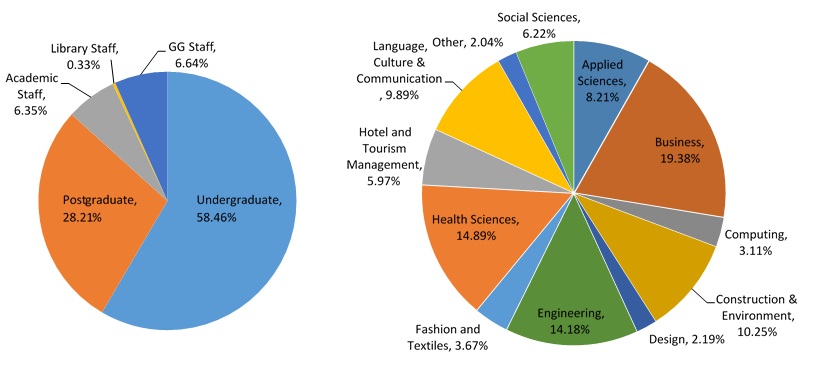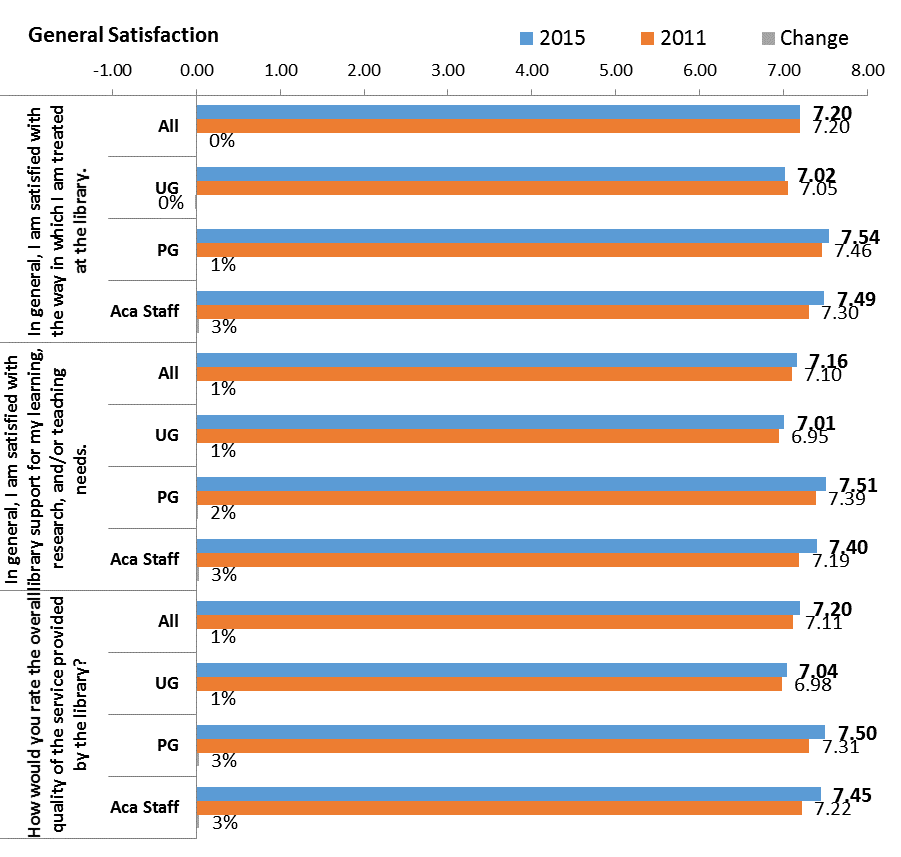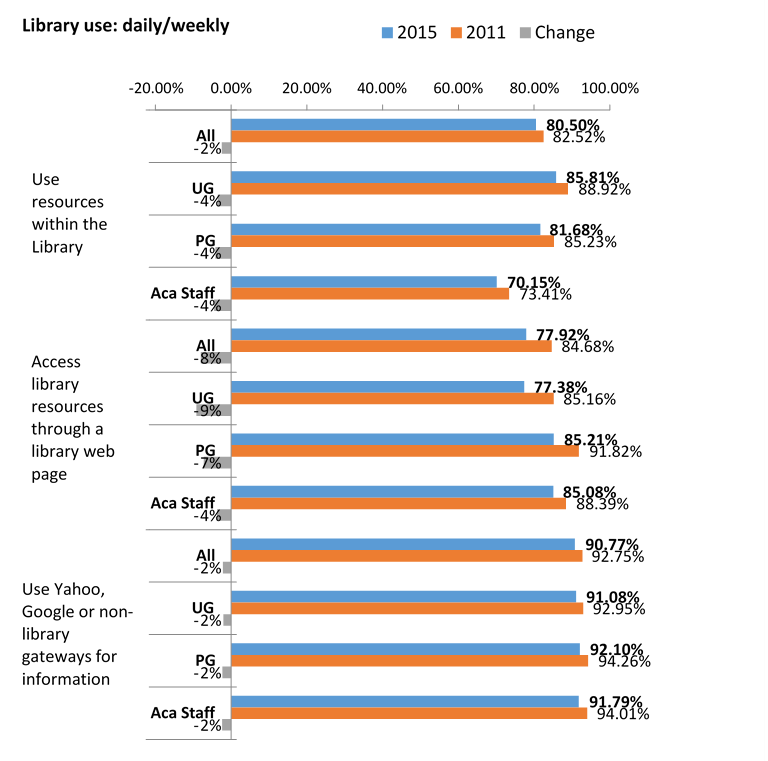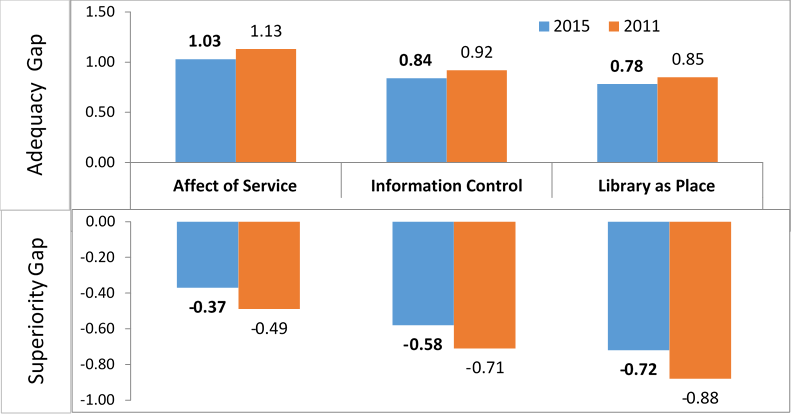Thank you to the 2,019 Library users who took part in the Library Survey from 29 Oct to 9 Dec 2015. Their valuable feedback will help the Library assess and improve its services, resources and facilities.
The Library has agreed, as a member of JULAC, to conduct the LibQUAL+ survey every few years apart together with participating JULAC libraries. The last LibQUAL+ survey conducted was in 2011. Below are highlights of the 2015 survey results:
The Library has agreed, as a member of JULAC, to conduct the LibQUAL+ survey every few years apart together with participating JULAC libraries. The last LibQUAL+ survey conducted was in 2011. Below are highlights of the 2015 survey results:

The survey, developed and administered by the Association of Research Libraries (ARL) of the United States, measures users' perceptions of service quality and identifies gaps between desired, perceived and minimum service levels. It consisted of 22 core questions, where users are asked to rate, on a 9‐point Likert scale (1=lowest, 9‐highest) on the following 3 dimensions:
- Affect of Service (i.e. how well library staff are delivering their services)
- Information Control (i.e. Library collections, physical and electronic, and tools to access them)
- Library as Place (i.e. Library building, equipment and facilities)
General Satisfaction
There were 3 questions related to level of general satisfaction on library services. Most mean scores in 2015 exceeded those in 2011. In all questions, postgraduates were consistently more satisfied (average score=7.52), followed by academic staff (7.45) and undergraduates (7.02). Academic staff was the user group with the greatest increase in average satisfaction score (3%). All user groups saw an increase in satisfaction on all questions with the only exception being UG, where a slight decrease was observed in the first question (7.05 to 7.02, 0% difference).

The Top 5
| Most Satisfied Services (by adequacy gap) |
Most Important Services (by desired level of services) |
Services Needing Improvement (by superiority gap) |
| Library staff who instill confidence in users (1.29) | Quiet space for individual work (7.86) | Quiet space for individual work (-0.85) |
| Library staff who are consistently courteous (1.10) | A haven for study, learning, or research (7.83) | Space for group learning and group study (-0.83) |
| Willingness to help users (1.04) | A library Web site enabling me to locate information on my own (7.71) | Making electronic resources accessible from my home or office (-0.76) |
| Library staff who have the knowledge to answer user questions (1.03) | Making electronic resources accessible from my home or office (7.70) | Library space that inspires study and learning (-0.71) |
| Library staff who deal with users in a caring fashion (0.99) | A comfortable and inviting location (7.69) | A haven for study, learning, or research (-0.65) |
By Type of Users
| Services least satisfied (lowest adequacy gap) |
Services needing improvement (highest superiority gap) |
|
| Undergraduates | Quiet space for individual work | Space for group learning and group study |
| Postgraduates | Quiet space for individual work | |
| Academic Staff | A library Web site enabling me to locate information on my own | A library Web site enabling me to locate information on my own, and Easy-to-use access tools that allow me to find things on my own |
Use of the Library
While the vast majority (90.77%) of users used search engines like Google regularly, most still use library resources either within the Library (80.50%) or via the Library Homepage (77.92%) on a daily or weekly basis.
Undergraduates are the most frequent users of library resources within the Library - 86% use resources within the library on a weekly or daily basis, in contrast to 82% of postgraduates and 70% of academic staff. Postgraduates and academic staff are more likely to use the Library Homepage to access library resources (85% for both, in contrast to 77% for undergraduates). Overall, there is a decline in use of the Library and web access - 2% and 8%, respectively. However, there is also a decline in the use of non-library gateways (2%) suggesting that, in general, our survey responders this time may have less frequent information finding and usage habits.

Perceived Level of Services – How users believe the Library is performing?
Compared with survey results in 2011, we see an overall improvement over time. PolyU scores are also above the average scores of other JULAC Libraries by 0.9-1.6%. Information Control is rated as the dimension with the highest perceived level of services (7.04). It is followed by Library as Place (6.97) and scoring slightly below that is Affect of Services (6.92). Library as Place saw the greatest improvement compared to 2011 (3%), with Affect of Service and Information Control both improved by 1%.

The Adequacy Gap & Superiority Gap ‐ where should we improve?
The Adequacy Gap is calculated by subtracting the minimum score from the perceived score. The smaller the score, the less satisfied the users are. Compared with 2011, there is a slight decline in all scores in 2015. As mentioned, perceived scores in all three dimensions saw an improvement. Therefore, the slight decline in Adequacy Gap may be attributed a relatively marked increase in users’ minimum acceptable level of services across all three dimensions. The least satisfied dimension is Library as Place (0.78), followed by Information Control (0.84). Affect of Service (1.03) is the most satisfied dimension.
Superiority Gap is calculated by subtracting the desired score from the perceived score. The more negative the score is, the more room there is for improvement. Compared with 2011, the overall superiority gaps in all areas have been reduced, meaning that we are relatively more able to meet users’ needs. In 2015, Library as Place has the biggest negative gap (‐0.72), followed by Information Control (‐0.58), and Affect of Service (‐0.37).

Written comments & Library Response
The last question of the LibQUAL+ survey was an open-end question for users to comment on the Library Services. A total of 1,078 comments were received and classified into various categories. Below are some highlights of the comments received, our responses and planned/implemented actions to address issues identified and to improve service quality.
- Collaborative and Individual Study Spaces
There were 169 comments on Group Discussion and Private Study Area. Users appreciated the newly renovated areas but commented that there are insufficient seats and space for individual and group study. In addition, they would like more group study rooms for discussion to support their learning. In view of the high demand for collaborative study space, in addition to 24-Hour Study Centre (Room L001) and Discussion Zone 2 (Room L010) on G/F, the Library has converted Room L019 into a discussion zone with a variety of new flexible furniture, and group study tables with video displays to facilitate group discussion and collaborative study. Four new study rooms have also been built by revamping the former Photocopying Unit area. Room L017 has also been refurbished with flexible furniture to support collaborative study and active learning. To alleviate long-term space shortage problem, the Library continues to pursue funding for the Library Extension and Revitalization Capital Works Project with the aim to expand and fully revive the Library’s building. Comments were also received on dated furniture and facilities users felt needed renewing and availability of power sockets. The Library has been refurbishing various reading rooms to renew furniture to meet user needs, including Room L019, L017, L401, and L501. Plans to renovate 4/F and 5/F research carrels have been submitted to the University’s Work Funding Sub-committee for their consideration. The Library also plans to refurbish Room L114, L501 and L505. Addition of over 200 power sockets in Room L114 (quiet study area) and Room L009 (collaborative study area) will be conducted in summer 2016.
- Information Resources and User Education
There were 127 comments on the Library collection. Users appreciated that the Library has acquired a wide array of resources useful for their learning, teaching and research. A user commented that “PolyU Lib provides very good resources, and particularly the online resources, which helps a lot in my research and teaching preparation.” In addition, users felt that the Library values their opinion in acquiring resources as they can recommend resources through the “Suggest a Purchase” service. To increase its provision of resources for users, the Library has implemented and planned various initiatives to expand its collection as expressed by users. Users also commented that Library workshops are useful and relevant for their academic pursuits at PolyU and would like more of these useful resources. The Library plans to continue providing more workshops, especially in evenings and Saturdays, as well as develop new workshop content for users.
- Equipment and Facilities
There were 77 comments from users appreciating the new notebook PCs loan service being useful for group discussions, and would like increased provision of this service. More notebook PCs have already been arranged to be purchased and will be made available for users once ready. Users also expressed their need for more and better maintenance of printers and copiers. The Library upgraded 14 network printers over the past year, and is targeting to replace all black and white printers before the next academic year. To improve Wi-Fi services, as welcomed by some users, the Library has worked with ITS to upgrade network routers to improve connection speed and performance.
Users also commented that there are inadequate female toilet facilities and would like hot water drinking facilities at the Library. The Library is currently working with the Facilities Management Office (FMO) to convert one male toilet into one for female use. The Library has pilot run a new hot-and-cold drinking machine and is working with FMO to assess the feasibility of expanding its use to the rest of the Library.
- Physical Environment
There were 79 comments from users stating that temperature inside the Library is too cold and that air quality could be improved. Working with FMO, the Library has submitted plans to upgrade the ventilation system to the University’s Work Funding Sub-committee for their consideration.
- User Services from Library Staff
There were 116 comments on Library staff. Users commended for Library staffs’ politeness, helpfulness and for providing valuable services to users. Some improvements in technical knowledge and intervening noisy users in quiet zones are welcomed. The Library has already scheduled in-depth technical training for counter and professional staff and plans to strengthen patrolling during peak exam periods.
For detailed data analysis, and summary of user comments and responses, please read the executive summary and full LibQUAL+ report.



 PolyU Library AI Chatbot
PolyU Library AI Chatbot